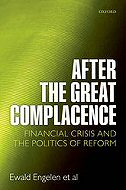After the Great Complacence:
Financial Crisis and the Politics of Reform
|
|
Ewald Engelen et.al.
|

|

What is the relationship between finance and politics? In a democratic system, what kind of control should elected governments have over the financial markets? What policies should be implemented to regulate them? What is the role played by different elites - financial, technocratic, and political - in the operation and regulation of the financial system?
These are some of the questions addressed in this challenging analysis of the particular features of the conditions and consequences of the financial crisis. The authors argue that the causes of the financial crisis lay in the bricolage and innovation in financial markets. This resulted in long chains and circuits of transactions and instruments that enabled bankers to earn fees, but which did not sufficiently take into account uncertainty, and unintended consequences. The hubristic detachment of regulators and politicians before 2007 ensured that they were then surprised by the massive, on-going financial crisis which they cannot now resolve because of the political positioning of finance as an obstacle to reform. In the authors' view the financial crisis was neither an unfortunate accident, nor an irresponsible conspiracy, but an elite political debacle.
In the wake of the crisis, the authors argue that social scientists, governments, and citizens need to re-engage with the political dimensions of financial markets. This book offers a controversial and accessible exploration of the disorders of our financial capitalism and its justifications. With an innovative emphasis on the economically 'undisclosed' and the political 'mystifying', it combines technical understanding of finance, cultural analysis, and al political account of interests and institutions.
|
|
